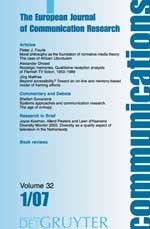Regulatory Choice in Communications Governance
2007
Michael Latzer
In: Communications – The European Journal of Communication Research, 32(3), 399-405
 |
Empirical research shows that there has been an increase in alternative regulatory institutions (self- and co-regulation) in convergent communications sectors, which, in combination with state regulatory bodies, are striving to achieve public goals. Growing reliance on private actors is leading to a remix of state regulation and alternative modes of regulation, which changes the state’s contribution to communications regulation. This raises the questions of why alternative regulation is introduced and how to decide on the adequate mix of state and alternative regulation from a public-policy perspective. Based on theoretical reasoning regarding the advantages and disadvantages of various modes of regulation and on international experiences with different regulatory modes, this paper presents a rough guideline for regulatory / institutional choice. It is intended to assist the political decisionmaking process in assessing regulatory institutional arrangements for given regulatory problems in the communication sector. |
